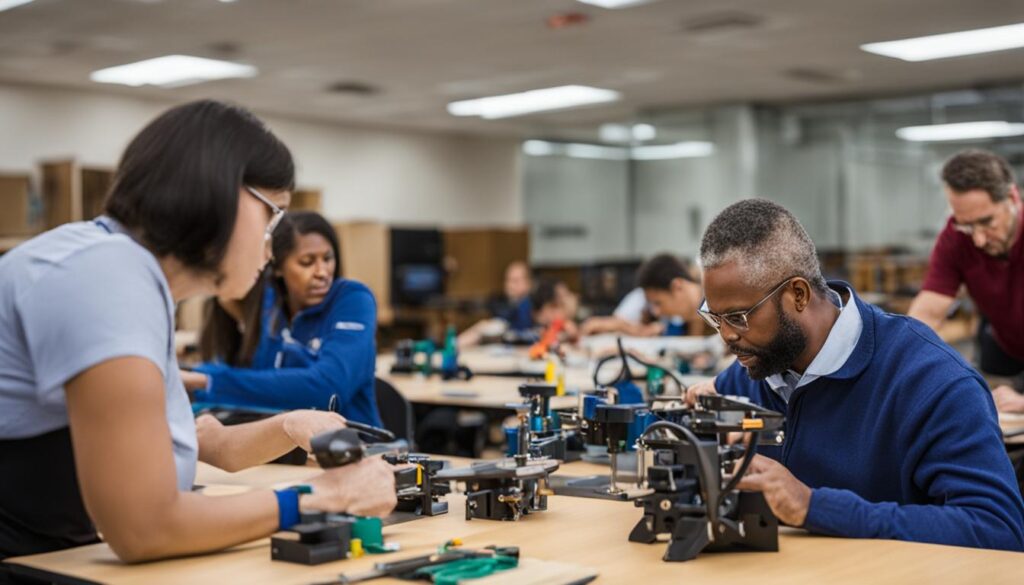Adult learners who want to pursue a college education or return to school after a break have several financial aid options available to them. They can apply for federal and state student aid by completing the Free Application for Federal Student Aid (FAFSA). In addition, some states, such as New York, offer need-based grants like the Tuition Assistance Program (TAP) for residents. Adult learners should review the paying for college section on the website of their chosen institution to explore their financial aid options further.
Key Takeaways
- Adult learners have access to various financial aid options when pursuing higher education.
- Completing the FAFSA is crucial for accessing federal and state student aid programs.
- States like New York offer need-based grants for residents.
- Exploring the paying for college section on the institution’s website can provide additional financial aid options.
- Financial aid plays a vital role in supporting adult learners in their educational journey.
Financial Aid Options for Military and Veterans
Military service members and veterans have specific financial aid options available to them to support their educational pursuits. These options are designed to cater to their unique needs and provide them with the necessary resources to achieve their academic goals.
Student Aid Programs for Military and Veterans
One of the primary student aid programs available for military and veterans is the GI Bill. The GI Bill offers educational assistance to eligible individuals who have served in the military. This program provides financial support for tuition, fees, and other educational expenses.
Additionally, military service members and veterans may also qualify for other federal student aid programs, such as Pell Grants and Federal Work-Study programs. These programs offer financial assistance based on their individual circumstances and can greatly reduce the financial burden of pursuing higher education.
Specialized Resources for Military and Veterans
In addition to federal student aid programs, military and veteran students can also take advantage of specialized resources offered by their institutions. Many colleges and universities have dedicated offices or departments that provide support and guidance specifically for military and veteran students.
These resources may include academic advising, career counseling, and assistance with navigating the financial aid process. By accessing these specialized resources, military and veteran students can ensure they are maximizing their financial aid opportunities and receiving the support they need to succeed academically.
| Financial Aid Option | Description |
|---|---|
| GI Bill | Provides educational assistance to eligible military service members and veterans. |
| Pell Grants | Federal grants based on financial need. |
| Federal Work-Study | Provides part-time employment opportunities for students with financial need. |
Overall, military and veteran students have a range of financial aid options available to them. By exploring these options and utilizing the resources provided by their institutions, they can make their educational dreams a reality.
Financial Aid for Returning Students
Returning students who have previous college credits can take advantage of various financial aid options to support their educational pursuits. By exploring transfer credits and readmission opportunities, these students can navigate the financial aspects of continuing their education.
Transfer Credits
One option for returning students is to speak with a transfer counselor at their chosen institution to discuss transferring their credits. This process involves evaluating the courses they have already completed and determining how those credits can be applied towards their new program of study. By transferring credits, returning students can potentially reduce the time and cost required to complete their degree.
Readmission
If returning students wish to re-enter the college or university where they were previously enrolled, they may be eligible for readmission. This allows them to continue their education at their familiar institution, building upon their previous coursework and experiences. The admissions office should be contacted to discuss the specific readmission requirements and procedures.
Financial aid options for returning students can vary depending on individual circumstances and institutional policies. It is important for these students to reach out to the appropriate offices at their chosen institution to fully understand the financial aid opportunities available to them. By taking advantage of transfer credits and exploring readmission possibilities, returning students can pave the way for a smooth transition back into their educational journey.
Financial Aid for Part-Time Students
Part-time students often face unique challenges when it comes to financing their education. However, there are several financial aid options available to support part-time students in their pursuit of a college degree. In this section, we will explore these options and provide valuable insights into how part-time students can access the financial assistance they need.
Financial Aid Programs for Part-Time Students
Part-time students may be eligible for a federal Pell Grant, which is a need-based grant that does not need to be repaid. The amount of the Pell Grant awarded to part-time students is prorated based on their enrollment status.
In addition to federal aid, part-time students attending schools in New York State can also explore various state aid programs. These programs include Part-Time TAP, Aid for Part-Time Students (APTS), and Part-Time Scholarship (PTS). These state aid programs provide additional financial support to part-time students based on their individual circumstances.
| Financial Aid Program | Eligibility Requirements | Funding Amount |
|---|---|---|
| Pell Grant | Need-based eligibility | Prorated based on enrollment status |
| Part-Time TAP | Enrolled part-time in New York State | Up to $1,645 per year |
| Aid for Part-Time Students (APTS) | Enrolled part-time in New York State | Varies based on individual circumstances |
| Part-Time Scholarship (PTS) | Enrolled part-time in New York State | Varies based on individual circumstances |
It is crucial for part-time students to familiarize themselves with the specific financial aid programs offered by their institution and state. They should reach out to their college’s financial aid office to understand the eligibility requirements and application process for each program. By taking advantage of available financial aid options, part-time students can alleviate some of the financial burdens associated with their education, making their academic journey more accessible and affordable.
Financial Aid for Adult Students Who Never Attended College
For adult students who have never attended college, there are numerous financial aid options available to make their educational dreams a reality. Many colleges and universities recognize the unique needs of adult learners and offer specialized programs and resources tailored specifically for them. It’s never too late to earn a college degree, and with the right financial assistance, adult students can achieve their educational goals.
“Education is the key to unlocking doors to new opportunities.”
Exploring Financial Aid Options
Adult students have access to a variety of financial aid programs, including scholarships, grants, and loans. It’s important for adult learners to research and understand the different types of financial aid available to them. Scholarships and grants are often awarded based on merit or financial need and do not need to be repaid. Loans, on the other hand, require repayment after graduation.
In addition to scholarships and grants, adult learners can also explore work-study programs. These programs allow students to work part-time while attending school, providing them with valuable work experience and financial support.
Choosing the Right Institution
When selecting a college or university, adult students should consider the institution’s commitment to supporting adult learners. Look for schools that offer flexible class schedules, including evening and weekend classes, as well as online learning options. These accommodations can make it easier for adult students to balance their education with work and family responsibilities.
Furthermore, adult learners should research institutions that have divisions or programs specifically designed for adult students. These programs often offer additional support services, such as academic advising, career counseling, and networking opportunities.
Covering the Cost of College
While the cost of college can be a significant financial burden, there are several financial aid options available to help adult students cover these expenses. In addition to scholarships and grants, adult students can explore federal student aid programs, such as the Free Application for Federal Student Aid (FAFSA), which may provide access to federal grants, loans, and work-study opportunities.
It’s important for adult students to carefully review the financial aid options offered by their chosen institution and determine the best combination of scholarships, grants, and loans to meet their needs. By taking advantage of available financial aid resources, adult learners can make their college aspirations a reality.
| Financial Aid Options | Description |
|---|---|
| Scholarships | Merit or need-based awards that do not require repayment. |
| Grants | Financial assistance based on need that does not require repayment. |
| Loans | Borrowed funds that require repayment after graduation. |
| Work-Study Programs | Part-time employment opportunities offered on campus. |
| Federal Student Aid | Financial assistance from the U.S. government, including grants, loans, and work-study. |
College Credit for Life Experiences
Adult learners have the opportunity to earn college credit based on their life experiences through programs such as the College Level Examination Program (CLEP). The CLEP exams are widely recognized by approximately 2,900 institutions across the nation, allowing adult learners to demonstrate their knowledge and potentially earn college credit without taking traditional courses.
With the CLEP exams, adult learners can showcase their proficiency in subjects such as English composition, mathematics, science, and foreign languages. By passing these exams, they can fulfill certain general education requirements, saving both time and money. It is important for adult learners to review the policies and requirements of their chosen institution to determine if they qualify for college credit based on the CLEP exams.

College credit for life experiences allows adult learners to leverage their knowledge and skills gained outside the classroom. It recognizes the value of real-world experiences and provides an opportunity to expedite their educational journey. Through programs like CLEP, adult learners can make significant progress towards their degree while focusing on subjects that align with their expertise.
Benefits of College Credit for Life Experiences
- Accelerated degree completion: By earning college credit for life experiences, adult learners can shorten the time it takes to earn a degree. This can be particularly advantageous for those looking to reenter the workforce or make a career transition.
- Cost savings: College credit for life experiences can help reduce tuition costs since adult learners do not need to enroll in additional courses to earn credit. This can make pursuing higher education more affordable and accessible.
- Flexibility in course selection: By earning college credit for their life experiences, adult learners have more flexibility in choosing the courses that align with their interests and goals. They can focus on advanced coursework or specialized subjects, enhancing their learning experience.
Overall, college credit for life experiences recognizes the unique knowledge and skills that adult learners bring to the table. It provides a way for them to earn credit for what they already know, making their educational journey more efficient and tailored to their individual needs.
Specialized Training for Adult Students
Adult learners who are looking to enhance their skills and advance their careers have access to specialized training programs specifically designed for them. These programs, offered by regional BOCES (Boards of Cooperative Educational Services) across the state, cover a wide range of fields including skilled trades, healthcare occupations, computer training, high school equivalency preparation, and English as a second language.
These specialized training programs provide adult learners with opportunities to acquire new skills, explore different career paths, and increase their employability. By participating in these programs, adult students can gain the knowledge and practical experience needed to succeed in today’s competitive job market. These programs are designed to be flexible and cater to the unique needs and schedules of adult learners.
For example, adult learners interested in learning a skilled trade such as plumbing or electrical work can enroll in BOCES programs that offer hands-on training and certification. Similarly, those seeking to enter the healthcare field can join programs that provide training for medical assisting, phlebotomy, or medical coding and billing. These specialized training programs are tailored to the demands of specific industries, equipping adult learners with the skills and qualifications necessary to thrive in their chosen field.

Here is an example of a table showcasing the different specialized training programs offered by BOCES:
| Program | Description | Durations |
|---|---|---|
| Skilled Trades | Provides hands-on training in plumbing, electrical work, carpentry, and HVAC systems. | 6 months to 2 years |
| Healthcare Occupations | Offers training for medical assisting, phlebotomy, medical coding and billing, and other healthcare careers. | 6 to 9 months |
| Computer Training | Equips adult learners with essential computer skills, software proficiency, and IT certifications. | 3 to 6 months |
| High School Equivalency Preparation | Prepares adult learners for the High School Equivalency Exam (GED or TASC) and provides academic support. | Variable |
| English as a Second Language | Helps non-native English speakers improve their language skills through intensive language instruction. | Variable |
These specialized training programs not only provide adult learners with practical skills and knowledge but also offer career counseling and job placement assistance. They are a valuable resource for adult learners looking to gain a competitive edge in the job market and pursue new career opportunities.
Conclusion
Financial aid plays a crucial role in supporting adult learners in their pursuit of lifelong learning and educational opportunities. Adult learners have access to a variety of federal and state student aid programs, scholarships, and grants to help them achieve their educational goals.
By taking advantage of these financial aid options, adult learners can overcome financial barriers and embark on their educational journey with confidence. Whether they are seeking a college degree, specialized training, or credit for life experiences, financial aid is available to help make their dreams a reality.
It is important for adult learners to thoroughly research and explore the financial aid resources offered by their chosen institution, as well as external opportunities. By doing so, they can maximize their chances of receiving the financial support they need to succeed.
As adult learners continue on their path of lifelong learning, financial aid remains a vital tool in ensuring that educational opportunities are accessible to all. By leveraging the available resources and support, adult learners can thrive in their educational pursuits and unlock a world of possibilities.
FAQ
What financial aid options are available for adult learners?
Adult learners can apply for federal and state student aid by completing the Free Application for Federal Student Aid (FAFSA). They can also explore need-based grants like the Tuition Assistance Program (TAP) offered by some states. It is recommended to review the paying for college section on the website of their chosen institution for further options.
What financial aid options are available for military and veterans?
Military and veterans have specific student aid options available to them. They can review these options in the Military Corner section on the website. It is important for them to be aware of the specific financial aid programs catered to their needs and take advantage of the resources available.
What financial aid options are available for returning students?
Returning students who have previous college credits can speak with a transfer counselor at their chosen institution to explore transferring their credits. They should review the Transfer Students section on the website for additional information. If they wish to re-enter the college or university where they were previously matriculated, they may be eligible for readmission. It is important for returning students to discuss their specific circumstances with the admissions office for detailed information.
Are there financial aid options for part-time students?
Part-time students may be eligible for a federal Pell Grant at a pro-rated amount based on their part-time study. Additionally, students attending schools in New York State can explore different part-time state aid programs such as Part-Time TAP, Aid for Part-Time Students (APTS), and Part-Time Scholarship (PTS). It is crucial for part-time students to familiarize themselves with the specific financial aid programs offered by their institution and state.
Are there specific schools and programs for adult learners?
Yes, there are numerous schools and programs available specifically for adult learners. Many colleges and universities offer degree programs with flexible options such as evening classes, weekend classes, and online courses tailored to the needs of adult students. Adult learners should research their options and find institutions that have divisions or programs specifically designed for them.
Can adult learners receive college credit for life experiences?
Yes, adult learners may be able to receive college credit for their life experiences through programs such as the College Level Examination Program (CLEP). CLEP exams are widely accepted at colleges and universities nationwide. Additionally, many institutions offer college credit for life experiences. Adult learners should explore the requirements and policies of their chosen institution to determine if they qualify for college credit based on their life experiences.
Are there specialized training programs for adult learners?
Yes, regional BOCES programs across the State offer specialized training for adult learners in various fields such as skilled and technical trades, health-related occupations, computer training, high school equivalency preparation, and English as a second language. These programs vary by region and provide opportunities for adult learners to acquire new skills and enhance their career prospects. Adult learners should reach out to their regional BOCES to explore the adult education classes available to them.
Why is financial aid important for adult learners?
Financial aid plays a crucial role in supporting adult learners in their pursuit of lifelong learning and educational opportunities. Adult learners can access federal and state student aid programs, explore scholarships and grants, and take advantage of specialized training programs. By understanding the various financial aid options available and researching their chosen institution’s resources, adult learners can overcome financial barriers and achieve their educational goals.
What Steps Can Adult Learners Take to Appeal for More Student Aid?
Adult learners who find themselves in need of more financial support can take several steps when appealing for additional student financial aid. Firstly, they should gather all relevant documentation to support their case. Then, they should reach out to the financial aid office of their educational institution to inquire about the appeals process. Adult learners should also make a compelling case by explaining their financial circumstances and any extenuating factors that could warrant additional aid. Lastly, following up and staying persistent throughout the process is crucial to maximize their chances of success when appealing for additional student financial aid.

